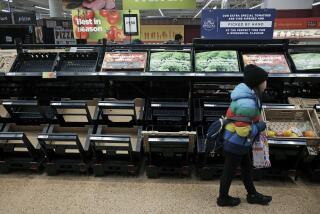Produce in High Gear
- Share via
There is such a thing as too much good weather, farmers keep telling us. But so far this winter, which has been warmer than usual despite the recent rain, shoppers have been remarkably successful at dodging the bullet.
Farmers plant crops with a goal of maintaining an even flow of fruits and vegetables to the grocery stores. For example, right now most winter vegetables are coming out of the Imperial Valley and western Arizona. These were planted during several weeks in late October and early November with the aim of ensuring a gradual harvest that would keep the produce pipeline full until mid- to late March.
But warmer winters like this one push crops along faster than normal. That causes problems by creating an early glut on the market. Broccoli and lettuce that were planted to be harvested next week may be ready at the same time as the stuff that was planted to be picked this week.
It can also create problems later, when all of those early harvests add up to a lot of empty fields. This is what was supposed to have happened just after the first of the year. Prices for most winter vegetables did, indeed, skyrocket for about a week, but then came the East Coast blizzard, cutting off transportation and flooding the West Coast with produce.
Prices returned to normal quickly. Iceberg lettuce, for example, is selling at wholesale for roughly a quarter of the price it was earlier in the month.
Indeed, produce prices for most of this winter have been an absolute steal--for consumers, that is. Lettuce and cauliflower are about the same price they were at this time last year. Broccoli and celery are significantly cheaper.
There are indications that a lot of vegetables are still in the fields. According to Department of Agriculture statistics, lettuce shipments from the Imperial Valley are running 22% behind last year, despite slightly increased acreage.
Still, farmers keep pointing at the shortages that are sure to be right around the corner. Somehow, they keep turning out to be wrong. But that, of course, doesn’t mean they won’t be right eventually.
More to Read
Eat your way across L.A.
Get our weekly Tasting Notes newsletter for reviews, news and more.
You may occasionally receive promotional content from the Los Angeles Times.











